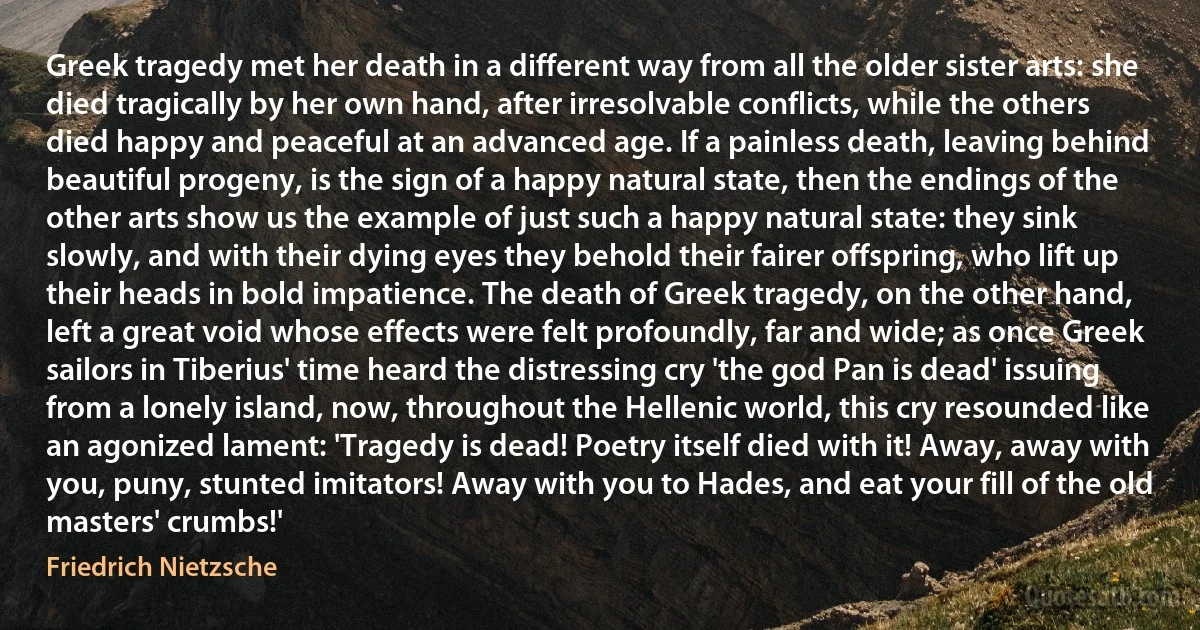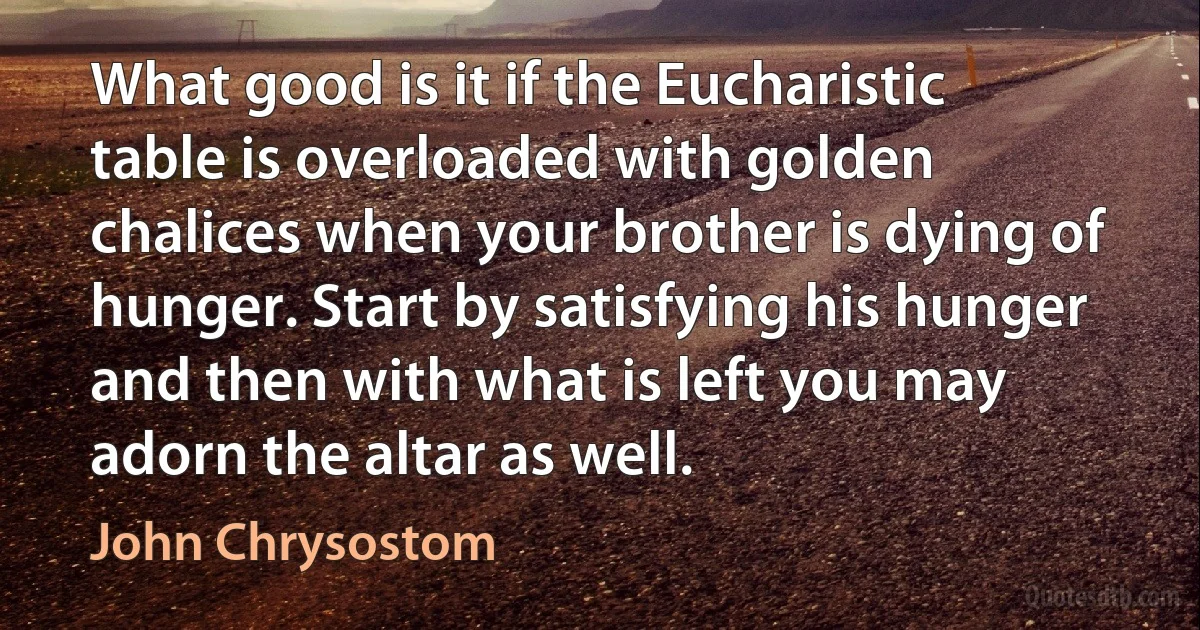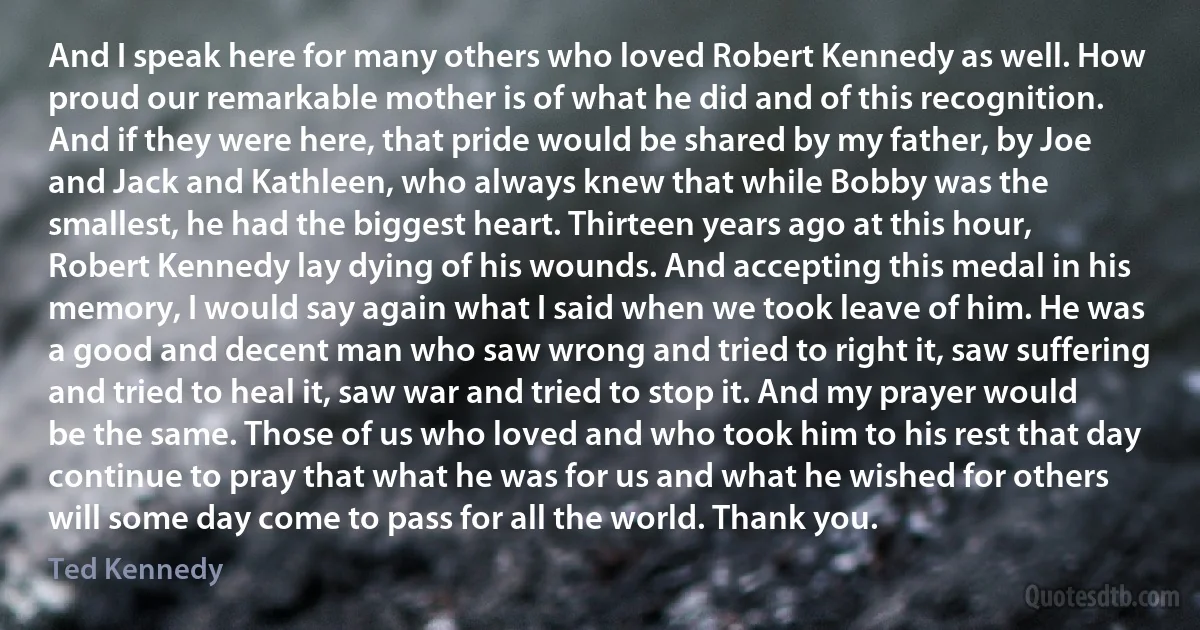Dying Quotes - page 62
Most rapes of men occur in prison. But even outside of prison, about 9 percent of reported rapes are against men (probably mostly by men, but no one knows for sure). Even rape outside of prison, then, is about as significant an issue for men as AIDS is for women-about 10 percent of the people dying of AIDS are women. Do we hear more about men being raped or about women getting AIDS?

Warren Farrell
We always look at the 'Fortune,' and we say, men in power, but we don't look at the glass cellar as opposed to the glass ceiling and say, men also are the homeless, men are also the ones that are the garbage collectors. Men are also the ones dying in construction sites that aren't properly supervised for safety hazards.

Warren Farrell
I am writing to all the Churches and I enjoin all, that I am dying willingly for God's sake, if only you do not prevent it. I beg you, do not do me an untimely kindness. Allow me to be eaten by the beasts, which are my way of reaching to God. I am God's wheat, and I am to be ground by the teeth of wild beasts, so that I may become the pure bread of Christ.

Ignatius of Antioch
Many in the audience had already been riled up by Trump's famous dismissal of McCain's years as a POW - "I like people who weren't captured." They'd been appalled when, just months earlier, a Trump White House aide allegedly dismissed the opinion of the cancer-stricken McCain because "he's dying anyway." They'd been enraged that, two days before the memorial service, Trump had again attacked McCain after reports of his refusal to lower American flags in his honor. On Election Day, many of them - led by McCain's widow, Cindy - took revenge: Arizona is on target to choose a Democrat - Biden - for the first time in almost 25 years. Biden's early lead was such that Fox News declared him the winner in the Grand Canyon State on Tuesday, altering the electoral math and pulling the rug out from under Trump's plans to claim victory in the overall polling before the Biden-leaning mailed ballots were counted in the Midwestern states.

John McCain
I think the characters I play go through tunnels, like in Three Colours : Blue, for example, where she's lost everything ... In The English Patient, she loses her best friend; this patient is dying in front of her – there's no hope, so she's going to start from the bottom. In films we see extremes, because it's where you have turning points. Before I thought there was a common denominator between my films - as if all my characters were sisters – but I'm not so sure now.

Juliette Binoche
Portraits of great war leaders or critical battles that looked flattering, well composed, and balanced always felt like propaganda. Tanaka had spent a lot of time in the halls of power. She'd seen many paintings of great men in uniform staring eagle-eyed into the distance where their future glory lay. She'd seen very few paintings of soldiers with only a ragged tent and a dying fire to hold back the cold nights before some stranger tried to bayonet them in the morning.

Daniel Abraham
The Swiss-born psychiatrist Elisabeth Kubler-Ross changed western cultural resistance to dealing with death, and the teaching of how to accept it... Kubler-Ross's best known contribution to the study, thanatology, that she had helped to create, was the five stages of dying people go through. She described them - denial, anger, bargaining, depression and acceptance - in her bestseller On Death And Dying (1969), written in two months. Not everyone experiences all five, she cautioned, but at least two are always present. The definition, reached after scores of interviews with people facing imminent death, helped the medical profession to deal with a factor it had long refused to acknowledge, especially in the US... She wrote more than 20 books.. A firm believer in a god and the life hereafter, she became fascinated with near-death experiences and an advocate for people's stories of seeing a shining light and familiar faces, before being brought back from the brink.

Elisabeth Kübler-Ross
Not one glance of compassion, not one commiserating reflection, that I can find throughout his book, has he bestowed on those who lingered out the most wretched of lives, a life without hope in the most miserable of prisons. It is painful to behold a man employing his talents to corrupt himself. Nature has been kinder to Mr. Burke than he is to her. He is not affected by the reality of distress touching his heart, but by the showy resemblance of it striking his imagination. He pities the plumage, but forgets the dying bird. Accustomed to kiss the aristocratical hand that hath purloined him from himself, he degenerates into a composition of art, and the genuine soul of nature forsakes him. His hero or his heroine must be a tragedy-victim expiring in show, and not the real prisoner of misery, sliding into death in the silence of a dungeon.

Thomas Paine
He was twice married, the first time to Miss Dolores Otero, daughter of Judge Antonio José Otero and his wife, Chaves de Otero. This happy union occurred March 15, 1851; from it eighteen children were born, many dying in early infancy. ...Mrs. Perea died in 1866. He was again married to Miss Gabriela Montoya, the daughter of Gerónimo Montoya and Lupita Perea de Montoya... The marriage occurred in 1875, and of which... eighteen children were born, ten of whom survive their father.

Francisco Perea
There is no man so fortunate that there shall not be by him when he is dying some who are pleased with what is going to happen. Suppose that he was a good and a wise man, will there not be at least some one to say to himself, Let us at last breathe freely, being relieved from this schoolmaster? It is true that he was harsh to none of us, but I perceive that he tacitly condemns us.-This is what is said of a good man. But in our own case how many other things are there for which there are many who wish to get rid of us.

Marcus Aurelius
The sexual revolution has begun to devour its children. The statistics on abortion, divorce, collapsing birthrates, single-parent homes, teen suicides, school shootings, drug use, child abuse, spouse abuse, violent crime, incarceration rates, promiscuity, and falling test scores show how this society, in which the cultural revolution is ascendant, is decomposing and dying. Empty nurseries and full waiting rooms outside the psychiatrist's office testify that all is not well. But before this diseased culture runs its course, it may take the West down with it.

Pat Buchanan
Historically, as the faith dies, the culture and civilization to which it gave birth die, and then the people die. And a new tribe with its own gods comes to occupy the emptying land. On the old and new continents, it is the native-born of European ancestry who are de-Christianizing, aging and dying.

Pat Buchanan



